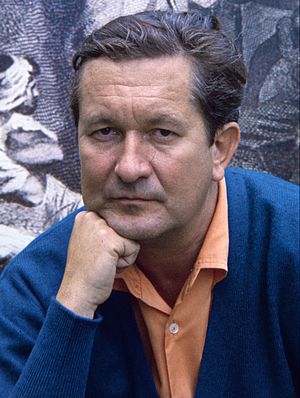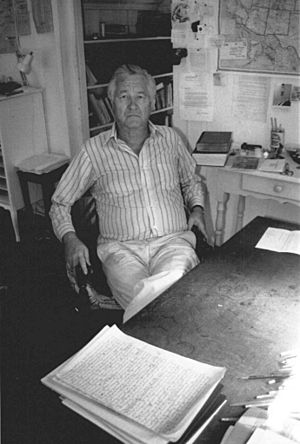William Styron facts for kids
Quick facts for kids
William Styron
|
|
|---|---|

William Styron, 1967
|
|
| Born | William Clark Styron Jr. June 11, 1925 Newport News, Virginia, U.S. |
| Died | November 1, 2006 (aged 81) Martha's Vineyard, Massachusetts, U.S. |
| Occupation | Novelist, essayist |
| Alma mater | Duke University |
| Period | 1951–2006 |
| Notable works | Lie Down in Darkness The Confessions of Nat Turner Sophie's Choice Darkness Visible |
| Spouse |
Rose Burgunder
(m. 1953) |
| Children | 4, including Alexandra |
| Signature | |
 |
|
William Clark Styron Jr. (June 11, 1925 – November 1, 2006) was an American novelist and essayist who won major literary awards for his work.
Styron was best known for his novels, including:
- Lie Down in Darkness (1951), his acclaimed first work, published when he was 26;
- The Confessions of Nat Turner (1967), narrated by Nat Turner, the leader of an 1831 Virginia slave revolt;
- Sophie's Choice (1979), a story "told through the eyes of a young aspiring writer from the South, about a Polish Catholic survivor of Auschwitz and her brilliant but psychotic Jewish lover in postwar Brooklyn".
In 1985, he had his first serious bout with depression. Once he recovered from his illness, Styron was able to write the memoir Darkness Visible (1990), the work for which he became best known during the last two decades of his life.
Contents
Early years
Styron was born in the Hilton Village historic district of Newport News, Virginia, the son of Pauline Margaret (Abraham) and William Clark Styron. He grew up in the South and was steeped in its history. His birthplace was less than a hundred miles from the site of Nat Turner's slave rebellion, later the source for Styron's most famous and controversial novel.
Styron's Northern mother and liberal Southern father gave him a broad perspective on race relations. Styron's childhood was a difficult one. His father, a shipyard engineer, had clinical depression, which Styron himself would later experience. His mother died from breast cancer in 1939 when Styron was still a boy, following her decade-long battle with the disease.
Styron attended public school in Warwick County, first at Hilton School and then at Morrison High School (now known as Warwick High School) for two years, until his father sent him to Christchurch School, an Episcopal college-preparatory school in the Tidewater region of Virginia. Styron once said, "But of all the schools I attended...only Christchurch ever commanded something more than mere respect—which is to say, my true and abiding affection."
Upon graduation, Styron enrolled in Davidson College and joined Phi Delta Theta. By the age of eighteen he was reading the writers who would have a lasting influence on his vocation as a novelist and writer, especially Thomas Wolfe. Styron transferred to Duke University in 1943 as a part of the U.S. Navy and Marine Corps V-12 program aimed at fast-tracking officer candidates by enrolling them simultaneously in basic training and bachelor's degree programs. There he published his first fiction, a short story heavily influenced by William Faulkner, in an anthology of student work . Styron published several short stories in the university literary magazine, The Archive, between 1944 and 1946. Though Styron was made a lieutenant in the U.S. Marine Corps, the Japanese surrendered before his ship left San Francisco. After the war, he returned to full-time studies at Duke and completed his Bachelor of Arts (B.A.) in English in 1947.
Career
After graduation, Styron took an editing position with McGraw-Hill in New York City. Styron later recalled the misery of this work in an autobiographical passage of Sophie’s Choice. After provoking his employers into firing him, he set about writing his first novel in earnest. Three years later, he published the novel, Lie Down in Darkness (1951), the story of a dysfunctional Virginia family. The novel received overwhelming critical acclaim. For this novel, Styron received the Rome Prize, awarded by the American Academy in Rome and the American Academy of Arts and Letters.
Military service
His recall into the military due to the Korean War prevented him from immediately accepting the Rome Prize. Styron joined the Marine Corps, but was discharged in 1952 for eye problems. However, he was to transform his experience at Camp Lejeune, North Carolina into his short novel, The Long March, published serially the following year. This was adapted for the Playhouse 90 episode "The Long March" in 1958.
Travels in Europe
Styron spent an extended period in Europe. In Paris, he became friends with writers Romain Gary, George Plimpton, Peter Matthiessen, James Baldwin, James Jones and Irwin Shaw, among others. In 1953, the group founded the magazine Paris Review, which became a celebrated literary journal.
The year 1953 was eventful for Styron in another way. Finally able to take advantage of his Rome Prize, he traveled to Italy, where he became friends with Truman Capote. At the American Academy, he renewed an acquaintance with a young Baltimore poet, Rose Burgunder, to whom he had been introduced the previous fall at Johns Hopkins University. They were married in Rome in the spring of 1953.
Some of Styron's experiences during this period inspired his third published book Set This House on Fire (1960), a novel about intellectual American expatriates on the Amalfi coast of Italy. The novel received mixed reviews in the United States, although its publisher considered it successful in terms of sales. In Europe its translation into French achieved best-seller status, far outselling the American edition.
Sophie's Choice
Styron's next novel, Sophie's Choice (1979), ..... It was banned in South Africa, censored in the Soviet Union, and banned in Poland for "its unflinching portrait of Polish anti-Semitism." It has also been banned in some high schools in the United States.
The novel tells the story of Sophie (a Polish Roman Catholic who survived Auschwitz), Nathan (her brilliant Jewish lover who had paranoid schizophrenia), and Stingo (a Southern transplant in post-World War II-Brooklyn who was in love with Sophie). It won the 1980 National Book Award and was a nationwide bestseller. A 1982 film version was nominated for five Academy Awards, with Meryl Streep winning the Academy Award for Best Actress for her portrayal of Sophie. Kevin Kline and Peter MacNicol played Nathan and Stingo, respectively.
Darkness Visible
Styron's readership expanded with the publication of Darkness Visible in 1990. This memoir, which began as a magazine article, chronicles the author's descent into depression and his near-fatal night of "despair beyond despair". It is a first-hand account of a major depressive episode and challenged the modern taboo on acknowledging such issues. ..... It explored the phenomenology of the disease among those with depression, their loved ones, and the general public as well. .....
Later work and acclaim
Styron was awarded the St. Louis Literary Award from the Saint Louis University Library Associates.
Styron was awarded the Prix mondial Cino Del Duca in 1985.
His short story "Shadrach" was filmed in 1998, under the same title. It was co-directed by his daughter Susanna Styron.
Other works published during his lifetime include the play In the Clap Shack (1973), and a collection of his nonfiction, This Quiet Dust (1982).
French President François Mitterrand invited Styron to his first Presidential inauguration, and later made him a Commander of the Legion of Honor. In 1993, Styron was awarded the National Medal of Arts.
In 2002 an opera by Nicholas Maw based on Sophie's Choice premièred at the Royal Opera House in Covent Garden, London. Maw wrote the libretto and composed the music. He had approached Styron about writing the libretto, but Styron declined. Later the opera received a new production by stage director Markus Bothe at the Deutsche Oper Berlin and the Volksoper Wien, and had its North American premiere at the Washington National Opera in October 2006.
A collection of Styron's papers and records is housed at the Rubenstein Library, Duke University.
In 1996 William Styron received the 1st Fitzgerald Award on the centenary of F. Scott Fitzgerald's birth. The F. Scott Fitzgerald Award for Achievement in American Literature award is given annually in Rockville Maryland, the city where Fitzgerald, his wife, and his daughter are buried, as part of the F. Scott Fitzgerald Literary Festival. In 1988 he was awarded the Edward MacDowell Medal.
He was a Charter member of the Fellowship of Southern Writers.
Port Warwick street names
The Port Warwick neighborhood of Newport News, Virginia, was named after the fictional city in Styron's Lie Down in Darkness. The neighborhood describes itself as a "mixed-use new urbanism development." The most prominent feature of Port Warwick is William Styron Square along with its two main boulevards, Loftis Boulevard and Nat Turner Boulevard, named after characters in Styron's novels. Styron himself was appointed to design a naming system for Port Warwick, deciding to "honor great American writers", resulting in Philip Roth Street, Thomas Wolfe Street, Flannery O'Connor Street, Herman Melville Avenue and others.
Death
Styron died from pneumonia on November 1, 2006, at age 81, on Martha's Vineyard. He is buried at West Chop Cemetery in Vineyard Haven, Dukes County, Massachusetts.
Personal life
While doing a fellowship at the American Academy in Rome, Styron renewed a passing acquaintance with young Baltimore poet Rose Burgunder. They married in Rome in the spring of 1953. Together, they had four children: daughter Susanna Styron is a film director; daughter Paola is an internationally acclaimed modern dancer; daughter Alexandra is a writer, known for the 2001 novel All The Finest Girls and 2011 memoir Reading My Father: A Memoir; son Thomas is a professor of clinical psychology at Yale University.
See also
 In Spanish: William Styron para niños
In Spanish: William Styron para niños


